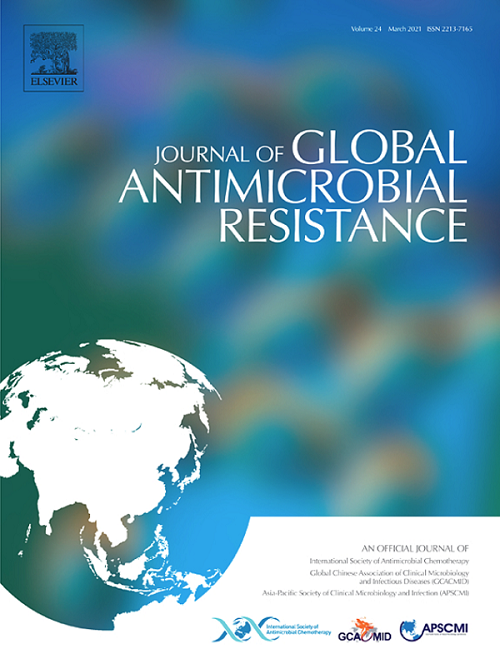Single nucleotide polymorphisms and penicillin non-susceptibility among invasive Streptococcus pneumoniae from Vietnam and India: Insights from a comparative genomics study
IF 3.2
3区 医学
Q2 INFECTIOUS DISEASES
引用次数: 0
Abstract
Objectives
Streptococcus pneumoniae (S. pneumoniae) is a significant cause of global morbidity and mortality across all age groups. Antimicrobial resistance (AMR), particularly penicillin resistance, is a significant treatment challenge. The study investigates AMR patterns among S. pneumoniae isolates from Vietnam, a country with high penicillin non-susceptibility, and India which in comparison has lower penicillin non-susceptibility. The present study focuses on penicillin resistance-associated genes and single nucleotide polymorphisms (SNPs), that contribute to pathogenicity.
Methods
Invasive S. pneumoniae belonging to serotypes 23F (n = 13) and 19F (n = 20) genome sequences from Vietnam (n = 13) and India (n = 20) were retrieved and annotated to identify core genes. These genes were screened for antimicrobial resistance using the database. The genome sequences were mapped to a reference genome to detect the gene variants and were analysed for identifying specific mutations that contribute to pathogenicity.
Results
Annotations identified pbp1a, pbp2b, and pbp2x (pbpX) as relevant AMR genes. In Vietnam, pbpX was a core gene, with 41 SNPs detected, of which 7 were deleterious mutations contributing to penicillin resistance. In contrast, pbpX was completely absent in the Indian genomes analysed.
Conclusions
The current study highlights the genetic basis of penicillin non-susceptibility among invasive S. pneumoniae serotypes 23F and 19F and focuses on regional variations in resistance between India and Vietnam. The pbpX was identified as a core gene among penicillin-resistant pneumococci in Vietnam. In India, the absence of pbpX highlights genomic diversity, distinct from the uniformity observed in Vietnamese genomes. The study further predicts that deleterious SNPs are associated with pathogenicity.

越南和印度侵袭性肺炎链球菌的单核苷酸多态性和青霉素非敏感性:来自比较基因组学研究的见解。
目的:肺炎链球菌(S. pneumoniae)是全球所有年龄组发病率和死亡率的重要原因。抗菌素耐药性(AMR),特别是青霉素耐药性,构成了重大的治疗挑战。该研究调查了来自青霉素非敏感性较高的越南和青霉素非敏感性较低的印度的肺炎链球菌分离株的AMR模式。目前的研究重点是青霉素耐药相关基因和单核苷酸多态性(snp),这有助于致病性。方法:对来自越南(n=13)和印度(n=20)的侵袭性肺炎链球菌23F (n=13)和19F (n=20)血清型基因组序列进行检索和注释,鉴定核心基因。从数据库中筛选这些基因的抗微生物药物耐药性。将基因组序列映射到一个参考基因组以检测基因变异,并对其进行分析,以确定导致致病性的特定突变。结果:注释鉴定出pbp1a、pbp2b和pbp2x (pbpX)为相关AMR基因。在越南,pbpX是核心基因,检测到41个snp,其中7个是导致青霉素耐药的有害突变。相比之下,pbpX在分析的印度基因组中完全不存在。结论:目前的研究强调了23F和19F侵袭性肺炎链球菌青霉素非敏感性的遗传基础,并重点研究了印度和越南之间耐药性的区域差异。在越南发现pbpX为耐青霉素肺炎球菌的核心基因。在印度,pbpX的缺失突出了基因组的多样性,这与在越南基因组中观察到的一致性不同。该研究进一步预测,有害的snp与致病性有关。
本文章由计算机程序翻译,如有差异,请以英文原文为准。
求助全文
约1分钟内获得全文
求助全文
来源期刊

Journal of global antimicrobial resistance
INFECTIOUS DISEASES-PHARMACOLOGY & PHARMACY
CiteScore
8.70
自引率
2.20%
发文量
285
审稿时长
34 weeks
期刊介绍:
The Journal of Global Antimicrobial Resistance (JGAR) is a quarterly online journal run by an international Editorial Board that focuses on the global spread of antibiotic-resistant microbes.
JGAR is a dedicated journal for all professionals working in research, health care, the environment and animal infection control, aiming to track the resistance threat worldwide and provides a single voice devoted to antimicrobial resistance (AMR).
Featuring peer-reviewed and up to date research articles, reviews, short notes and hot topics JGAR covers the key topics related to antibacterial, antiviral, antifungal and antiparasitic resistance.
 求助内容:
求助内容: 应助结果提醒方式:
应助结果提醒方式:


